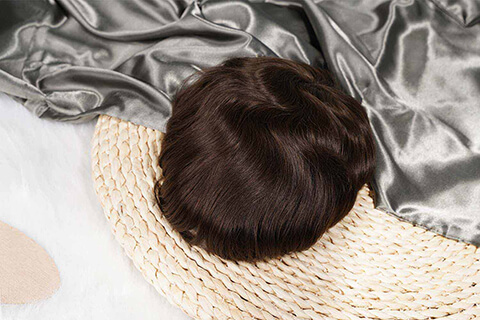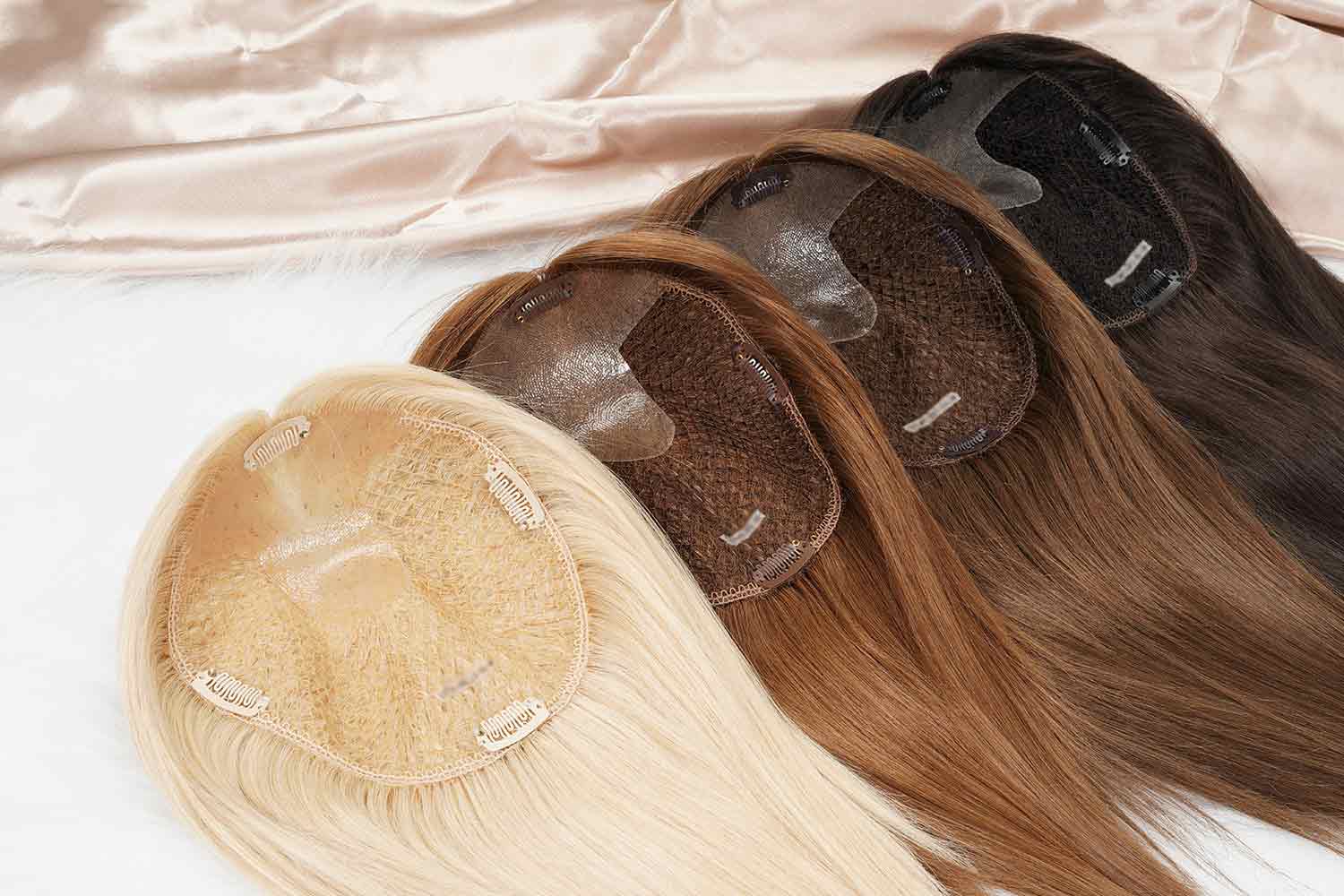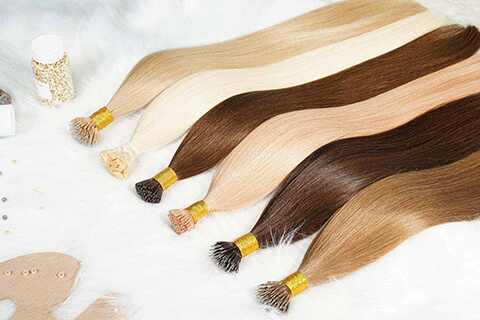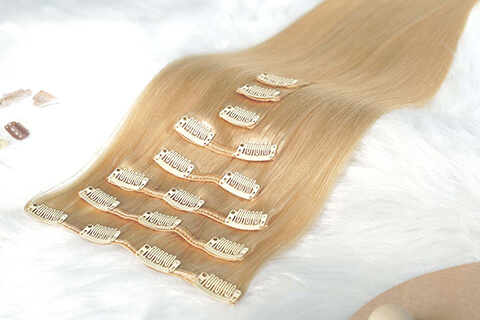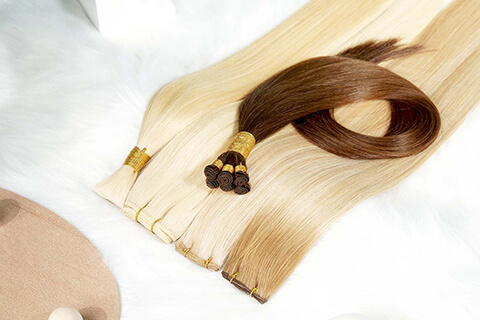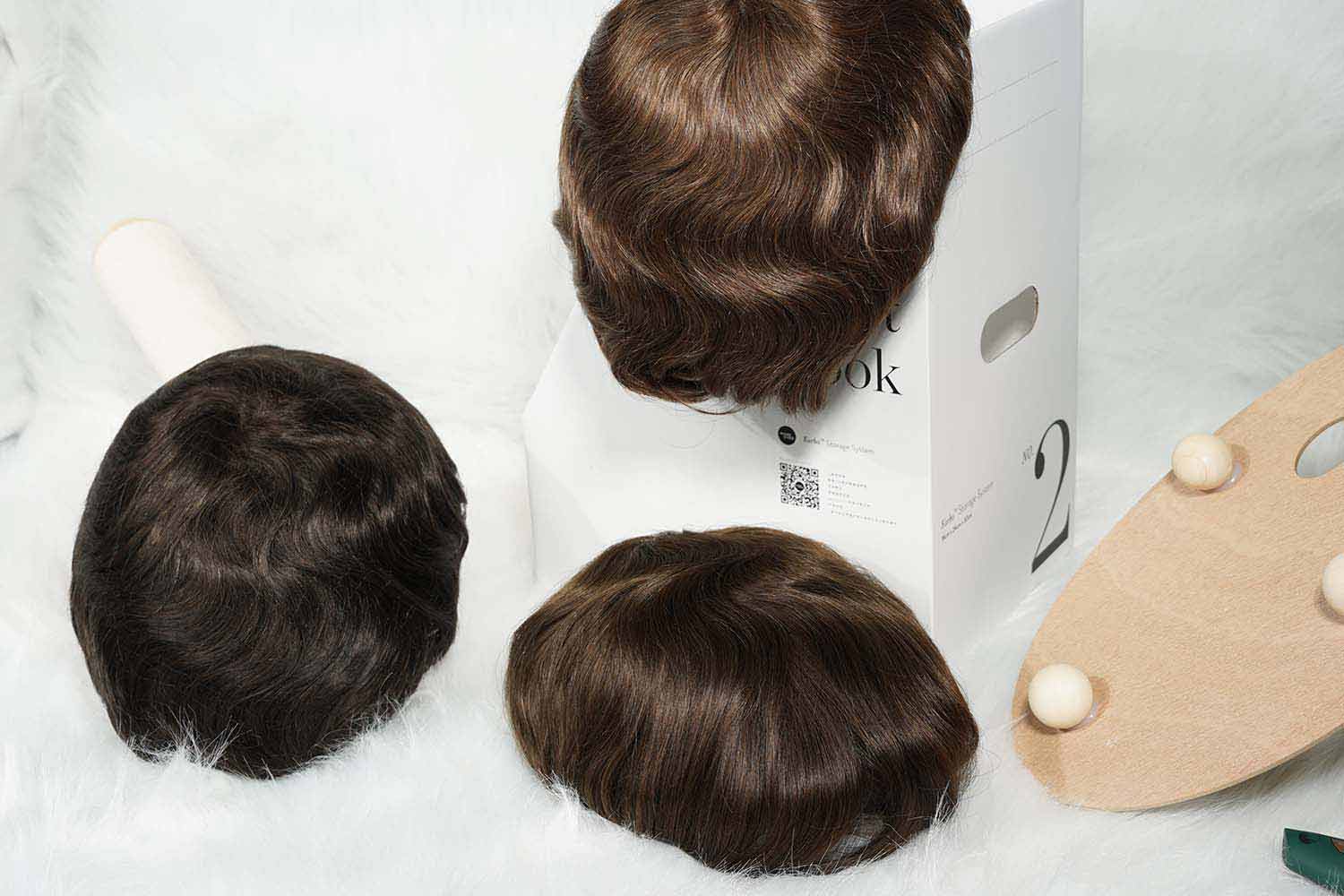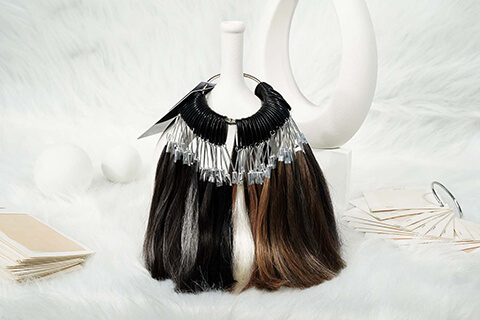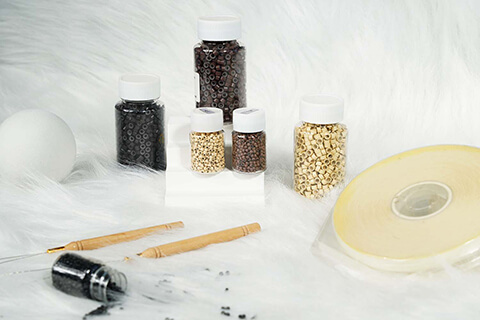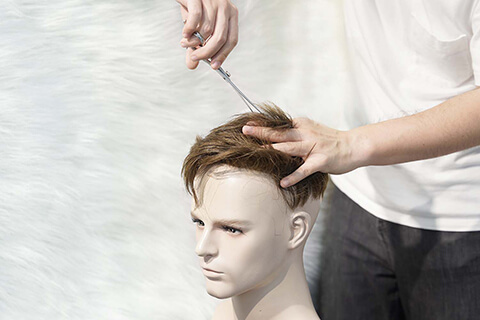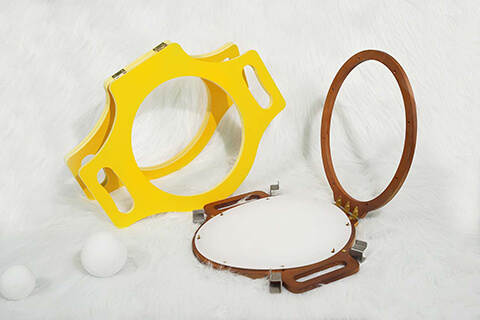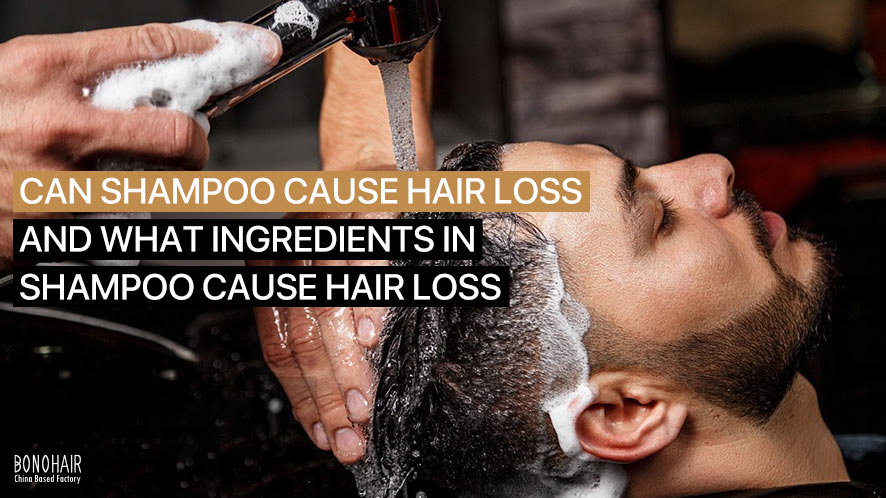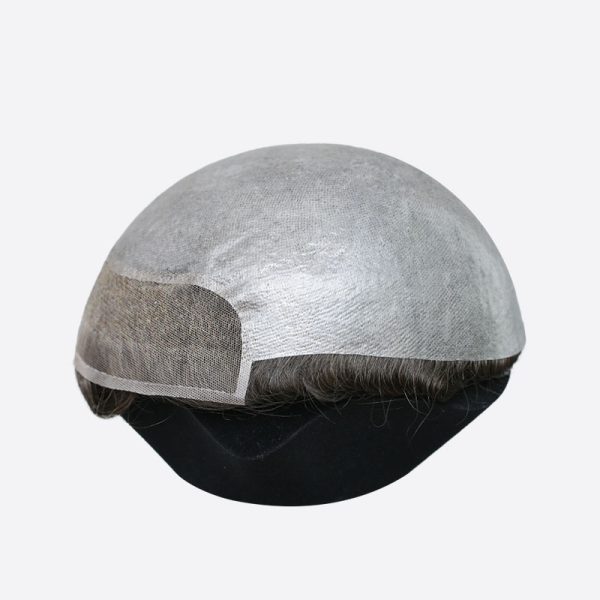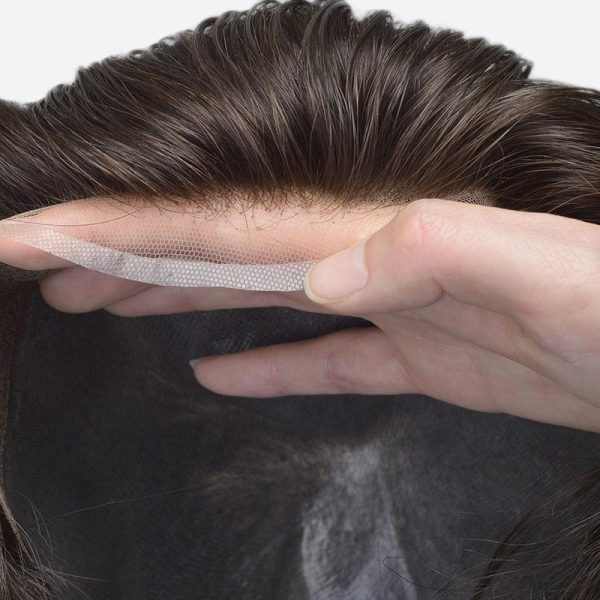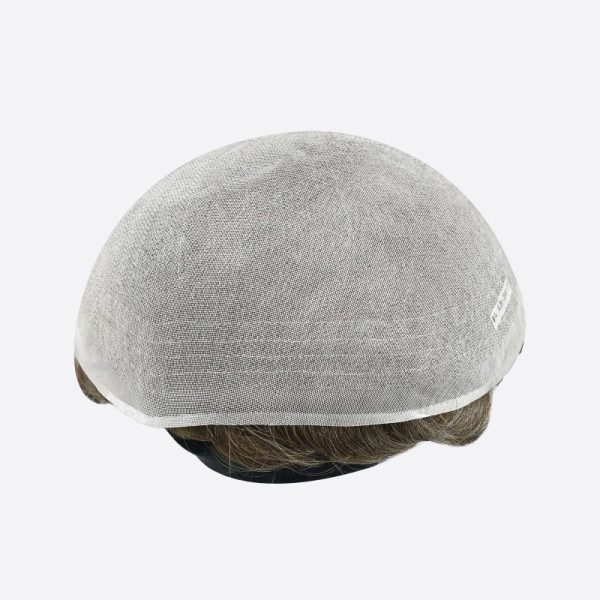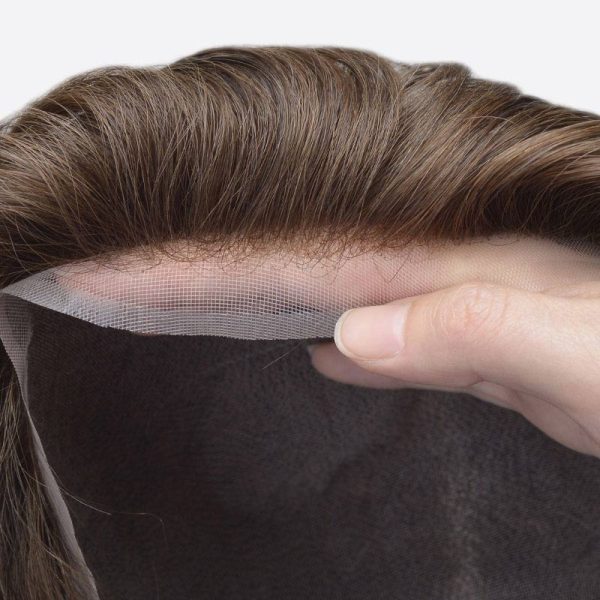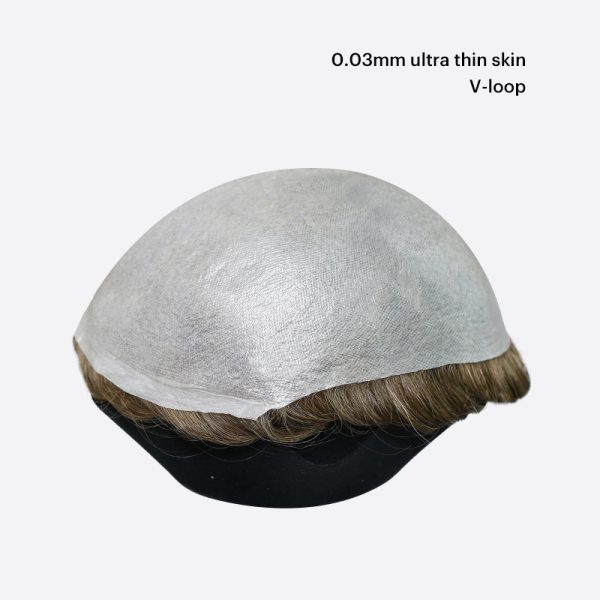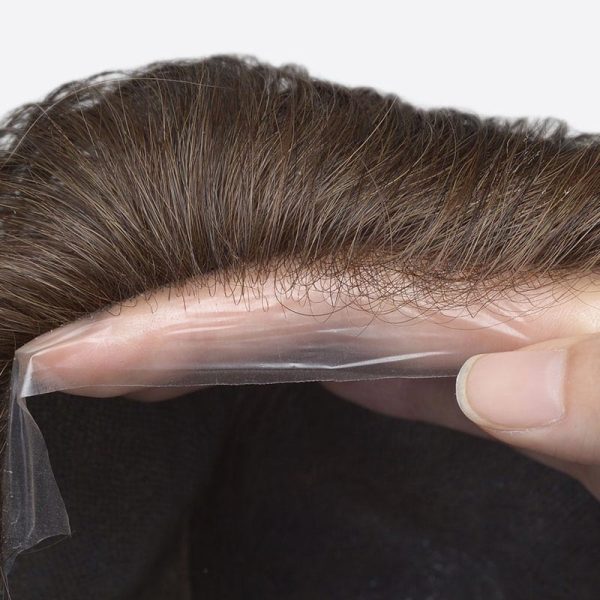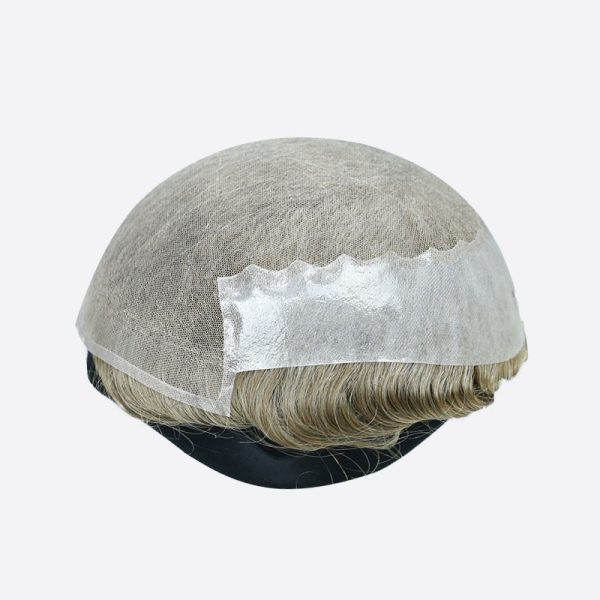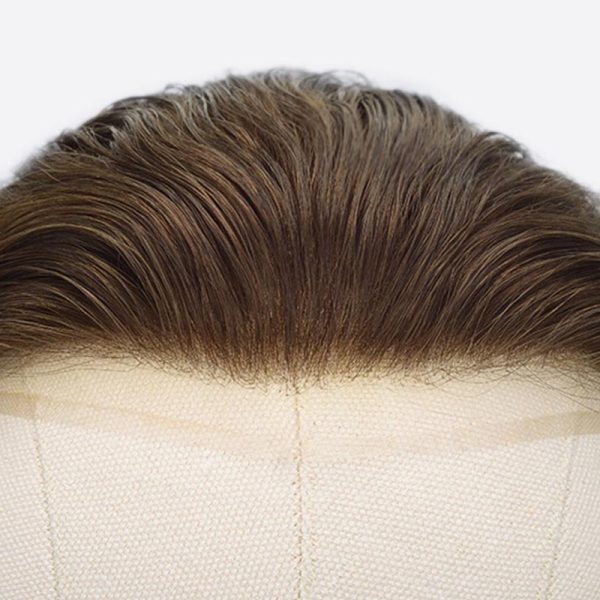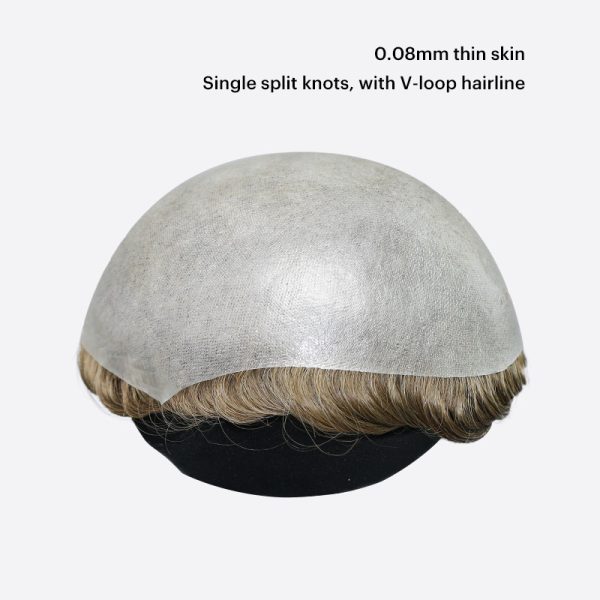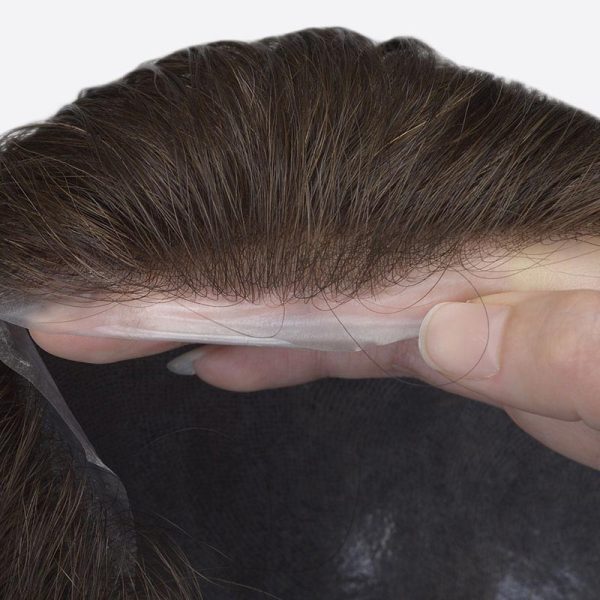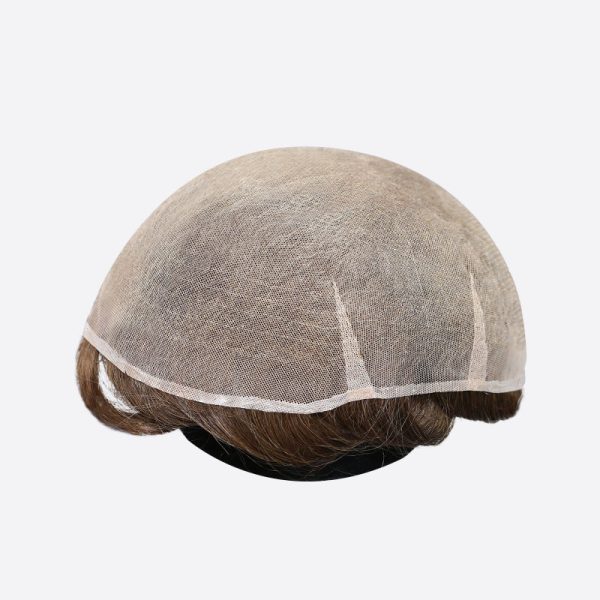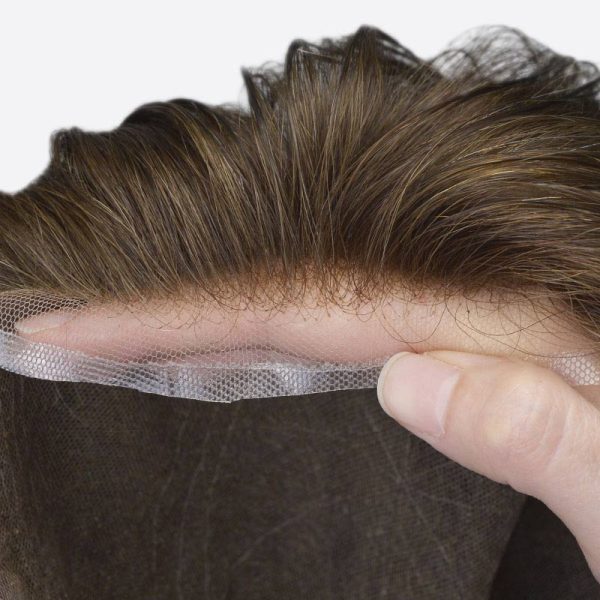One thing we all want is to have thick, healthy hair. This is ultimately determined by having a consistent hair care routine. Taking time to care for your hair every week is guaranteed to protect the health of your hair. One of the essential key steps of every great hair care routine is cleaning the hair with shampoo. Washing hair is vital for hair growth. However, some people tend to lose hair during or after the shampoo process. This brings up the question: Can shampoo cause hair loss? And if it does, what ingredients in shampoo cause hair loss? In this article, we get to understand shampoo and the basis it has when it comes to hair loss.
The shampoo is a viscous liquid formulated as a cleansing agent meant to effectively clean hair. The shampoo is made of different ingredients that play a key function in its formulation:
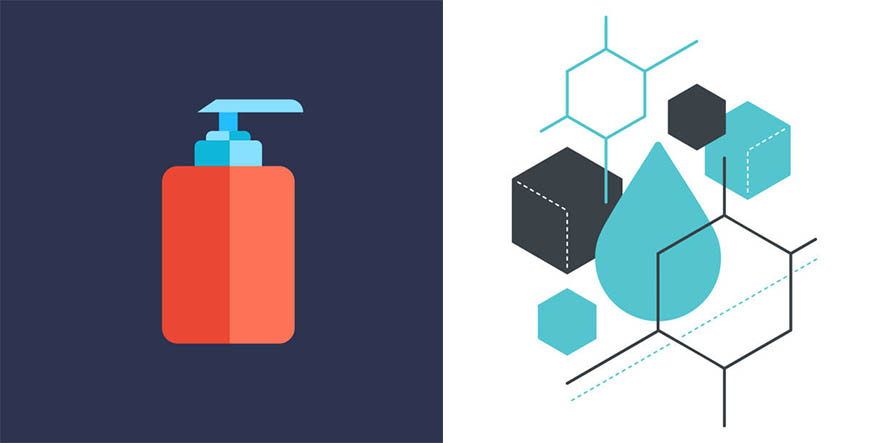
- Cleansing agents- these are surfactants and detergent ingredients that break down oil, dirt, grease, and gunk in the hair. Thereby, effectively cleaning the hair and scalp.
- Conditioning agent- when hair is shampooed, the sebum (hair’s natural oils) is stripped and the hair cuticle is left open. Hair cuticles are like doors that open and close to let in moisture and hair products. When hair cuticles are open, it can leave the hair dry. Conditioning agents are meant to gently condition the hair. Fatty alcohol prevents frizz, static, and flyaways; and silicone will help detangle and retain moisture.
- Protectants- Shampoos will contain ingredients that can deal with UV protection properties, protection from color change, or heat damage repair.
- Cosmetic ingredients- a lot of shampoos contain aesthetic ingredients that make the shampoo more appealing and attract consumers to buy it. These ingredients are not necessary and do not affect the efficiency of the shampoo. This includes artificial fragrance, artificial color, and lather.
- Functional ingredients- these are ingredients that aid in the uniform viscosity of the shampoo and protect the shampoo from going bad. This includes thickening agents and preservatives.
Shampoos are extremely necessary and play a pivotal role in the health of the hair.
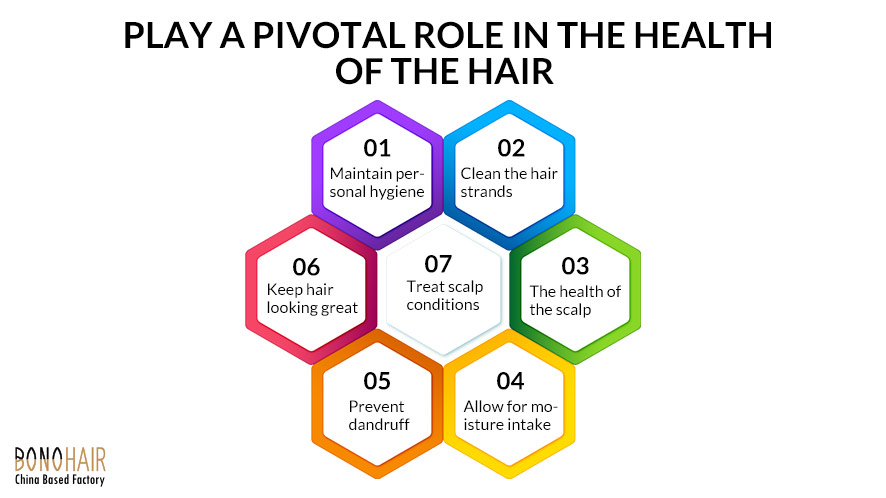
- Maintain personal hygiene – it is crucial to clean the hair to get rid of dirt, just as you wash your body. Dirty hair can have a bad odor. Your hair is amongst the first things people notice. You want to smell great and look presentable in public.
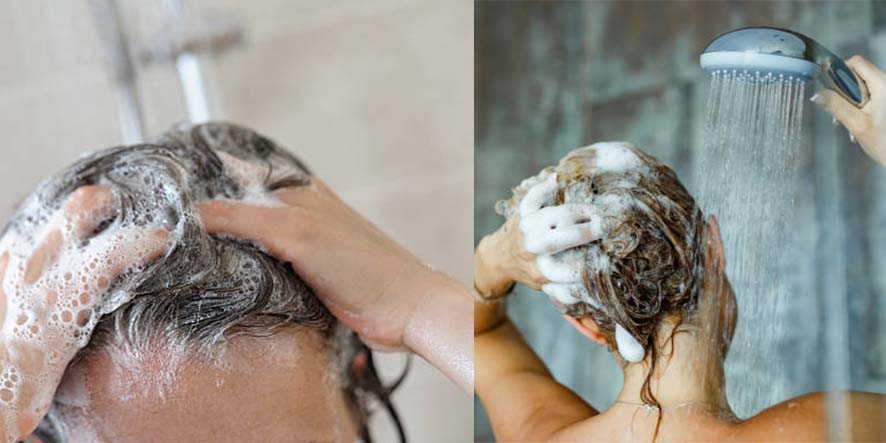
- Clean the hair strands – shampoo will get rid of all the excess sebum, dirt, environmental pollutants, product build-up, dead skin cells, or other gunk in the hair.
- The health of the scalp– it is important to get rid of impurities or excess sebum that may clog the follicles. Follicles contain active cells that are responsible for hair growth. With clogged follicles, it may disrupt the circulation of nutrients that are meant to nourish and protect the hair.
- Allow for moisture intake– the hair cuticles are porous, meaning they can only allow a certain amount of moisture into the hair strands to replenish and strengthen the hair. If hair is not clean, hair cuticles will not open as the hair strands are already filled with old products. Therefore, attempting to add the product to hair will be futile. The product will sit on top of the hair. Unable to moisturize the hair will lead to dry and weak hair that is susceptible to breakage. Clean hair is a canvas for optimum moisture absorption.
- Prevent dandruff – dirty scalp can disrupt the normal production of sebum which is supposed to nourish, lubricate, and safeguard the hair and scalp. A clean head will prevent dryness, dandruff, or flaking.
- Keep hair looking great – dirty dry hair looks lifeless, limp, dull, and your styles do not seem to look great. When hair is clean, it looks soft, shiny, vibrant, and healthy. Your favourite hairstyles also look their best.
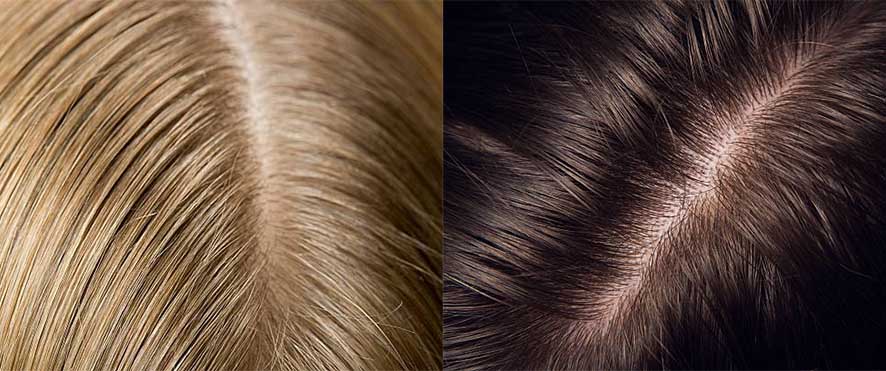
- Treat scalp conditions– shampoo can contain amazing ingredients that can treat scalp conditions such as eczema, psoriasis, inflammation, or irritation. Shampoo with ingredients like tree tea oil or peppermint oil has a cooling, tingling sensation, will stimulate the scalp and sleeping follicles, and help with hair growth. In shampoos, tea tree oil has antiseptic properties that will clear out dead skin cells and bacteria and heal any scalp issues.
Despite all the fantastic functions that shampoo has on our hair, there is a huge debate on whether shampoo causes hair loss. Yes, shampoo is in fact a huge culprit when it comes to hair loss, thinning, and breakage on one’s hair. A lot of people have experienced a significant amount of hair loss linked to using shampoos. What shampoo causes hair loss. An average human has over 250,000 hair strands on their head. We shed 50-100 hair strands a day. Hair is complex. Each hair strand goes through 4 stages of the hair growth cycle. One of the stages is the exogen phase, a.k.a the shedding phase. It is a natural process. However. Some shampoo can increase the amount of time the hair strand spends in the exogen phase, causing unnecessarily more shedding, which will lead to hair thinning.
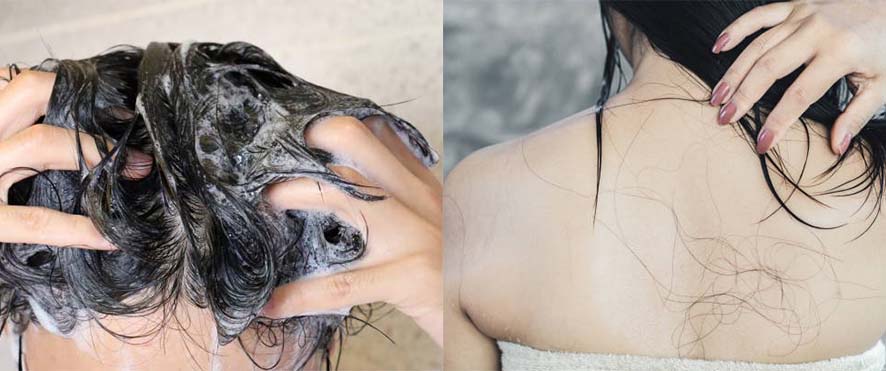
If your hair shedding is consistent during the shampoo process, that is your normal shedding. However, if they shed excessively, that can be a problem. Choosing a shampoo that matches your hair texture and hair needs is important. What shampoo causes hair loss? There are several types of shampoos.
Medicated shampoo:
- Clarifying shampoo
- Color protecting shampoo
- Moisturizing shampoo
- Everyday shampoo
- Oily shampoo
- Two in one shampoo
Nobody wants to experience hair loss through their shampoo. The shampoo is an important mandatory step in hair care. If experiencing hair loss, it is important to know what shampoo causes hair loss. Knowing this will help stop hair loss and prevent any further damage by using shampoos that cause hair loss.
What Ingredients in Shampoo Cause Hair Loss
What ingredients are used in your shampoo is extremely vital in determining what shampoo causes hair loss. It is important to read the ingredient label on a shampoo bottle before purchasing. Manufacturers are notorious for adding ingredients to the shampoo that over time cause hair loss. Below we examine common ingredients found in your shampoo that could be causing hair loss. These ingredients should either be avoided altogether or go for a shampoo that has fewer of these harmful ingredients.
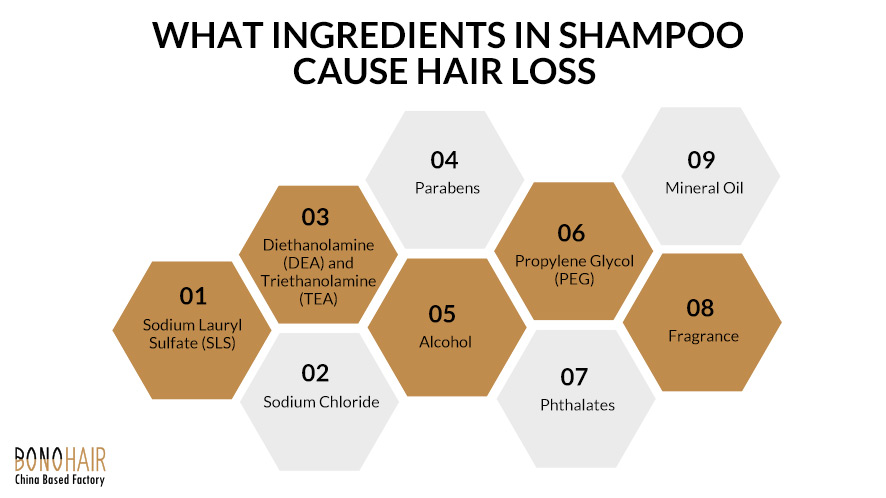
Sodium Lauryl Sulfate (SLS)
Sodium Lauryl Sulfate, also known as sulfates, is a cleaning agent. It is an active ingredient that is found in industrial detergents as it can emulsify stubborn dirt, oil, grease, or petroleum oil. When diluted it can be used for skin care and hair care to clean the hair. As a surfactant, it helps lower the surface tension between the shampoo and your hair strands. It is also responsible for that lather you get when you rub shampoo on your wet hair. In small amounts,, sodium lauryl sulfate is okay and will work great. However, some shampoos with higher concentrations will clean the hair too squeaky clean and strip the natural oils and moisture. Once done shampooing sodium lauryl sulfate will leave your hair extremely dry and fragile. With hair dry and weak exposed it is more susceptible to snap off, causing breakage and hair loss.
Sodium Chloride
Sodium chloride is a thickening product that provides shampoo with that rich and creamy feeling a lot of shampoos have. Shampoos that have both sodium lauryl sulfate and sodium chloride are likely to dry the scalp and cause hair loss. In small amounts, sodium chloride is great; however, in high concentrations can take a negative toll on tilt hair health and cause hair loss. It will dry the scalp, stripping it of its natural oil. A dry scalp leads to a lot of itchiness that can cause inflammation in the scalp. An irritated scalp will inhibit hair growth and cause hair loss.
Diethanolamine (DEA) and Triethanolamine (TEA)
They are both synthetic ingredients that act as a forming agent to help other shampoo ingredients work cohesively. Both are also emulsified to help lower the surface tension between the oil solvable ingredients and water-soluble ingredients so that they can mix well together. Hair is made of keratin which is a protein that forms the bond structure of the hair strands. Diethanolamine and triethanolamine are known to harm the hair’s keratin. This leads to damaging the hair’s bond structure which will early the hair and causes breakage.
Parabens
It is a type of preservative that prevents the growth of fungi and bacteria in the shampoo. Paraben helps extend shampoo shelf life to 12-24 months. Parabens are known as endocrine disruptors, which mess with the normal function of the hormonal system in both men and women. This encourages hair loss. Parabens also increase dryness in the scalp and itchiness which can cause hair loss.
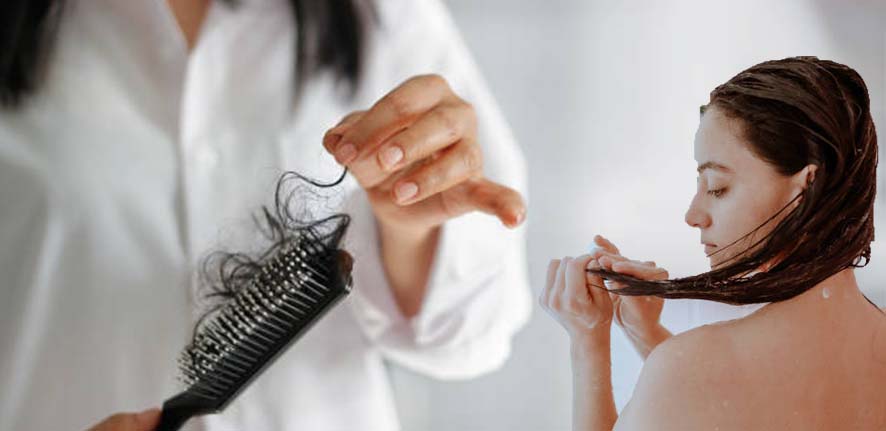
Alcohol
There are different types of alcohols; fatty alcohols such as fetal alcohol and stearyl alcohol aid in preventing frizz and softening hair and helping retain moisture. Alcohols such as propanol and isopropyl alcohol are ingredients found in shampoo that cause hair loss. Such alcohols impact the sebum level in the scalp. This will inhibit the usual production of sebum, which means hair strands are not nourished and protected, making them brittle and prone to breakage. Alcohol should never be amongst the first 5 ingredients in your shampoo. In high concentration will damage hair and cause hair loss.
Propylene Glycol (PEG)
Also known as polyoxyethylene, it helps absorb other shampoo ingredients into the shampoo mix, acting as a binding agent. Nonetheless, it is known for being a skin irritant if in high concentration. Irritating the scalp will lead to scalp inflammation and flaking, which can altogether cause hair loss as your follicles are disturbed.
Phthalates
Not only is it not good for the environment but it is known to interfere with the hormonal system and cause hair loss.
Fragrance
Let’s be honest. We tend to go for products that smell good. Great smelling shampoos are appealing to consumers. You will find most people solely buy shampoos because of the smell. However, artificial fragrances are never good for the skin or scalp. Artificial fragrances are known to cause skin dermatitis. Most fragrances are formulated with unknown toxic ingredients, which can cause skin irritation and hair loss. Avoid shampoos with artificial fragrances and for a no fragrance or all-natural fragrance shampoo.
Mineral Oil
Mineral oils act as a lubricant to protect the hair strands after stripping the hair clean with the shampoo and no sebum is left. Despite preventing dryness and tangling, they can suffocate the scalp and block moisture from entering the hair cuticles. This can likely cause hair loss.
How to Reduce Hair Loss While Shampoo
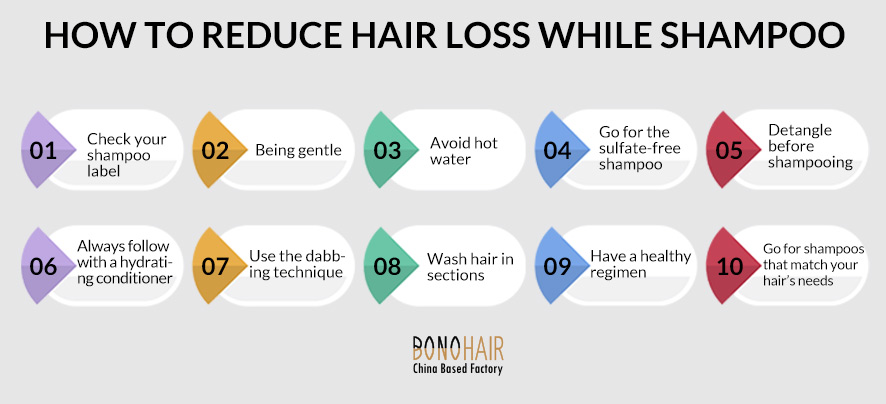
- Check your shampoo label- as we have told you, the ingredients to look for and try to avoid. Read the labels and make sure the ingredients used in the shampoo will not cause hair loss.
- Being gentle- hair is the most fragile when wet as hair is stretched and more susceptible to breakage. Be gentle on your hair during the shampoo process to avoid hair loss.
- Avoid hot water- hot water is damaging to hair. It will leave the hair cuticles open and cause hair to dry out. Additionally, hot water can damage the hair’s bond structure, which can lead to hair loss. Use lukewarm water when shampooing the hair.
- Go for the sulfate-free shampoo- there are very many well-formulated shampoos that are sulfate-free that can clean your hair by stripping the hair dry. They are also mild and gentle on the hair and scalp.
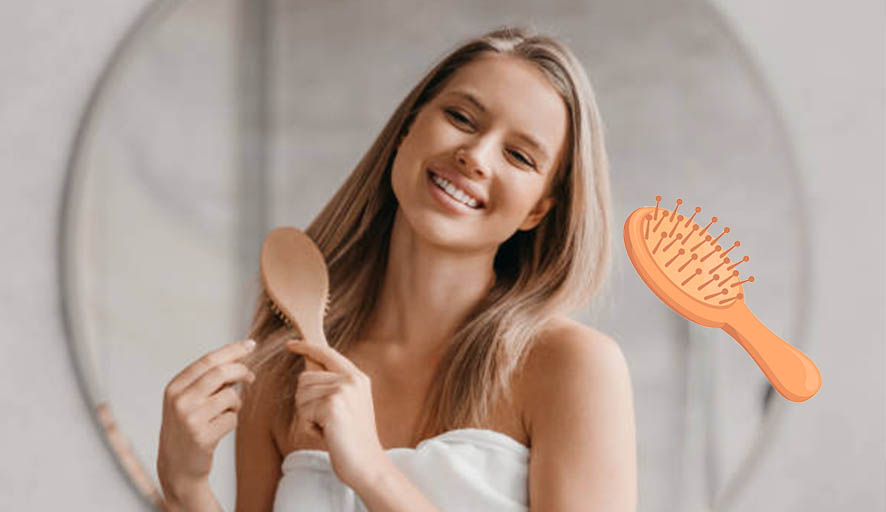
- Detangle before shampooing – shampooing hair with tangles, knots, and shed hair intertwined will cause more problems and cause unwanted hair breakage. Gently get rid of all knots, tangles, and shed hair before you start the shampoo process.
- Always follow with a hydrating conditioner – conditioners are great in restoring lost moisture from the shampoo step. Conditioners will moisturize and soften the hair making it more manageable and preventing breakage.
- Use the dabbing technique- if you are vigorously rubbing your hair strands and causing matting, this is causing hair loss. Gently massage and dab the scalp and wash hair strands in a downward motion to prevent tangling. Do not scrunch the hair.
- Wash hair in sections – if you have thick long hair, you can separate it into sections to be thorough yet gentle to avoid breakage.
- Have a healthy regimen- if you are neglecting your hair for weeks going straight to shampooing the hair will experience a lot of breakages. Keep your hair in good condition for an easy and hair loss-free shampoo time.
- Go for shampoos that match your hair’s needs – if the hair is dry, opt for a moisturizing shampoo, if colored, go for a hair color shampoo. This will ensure the shampoo can clean the hair and strengthen and improve your hair’s overall condition.
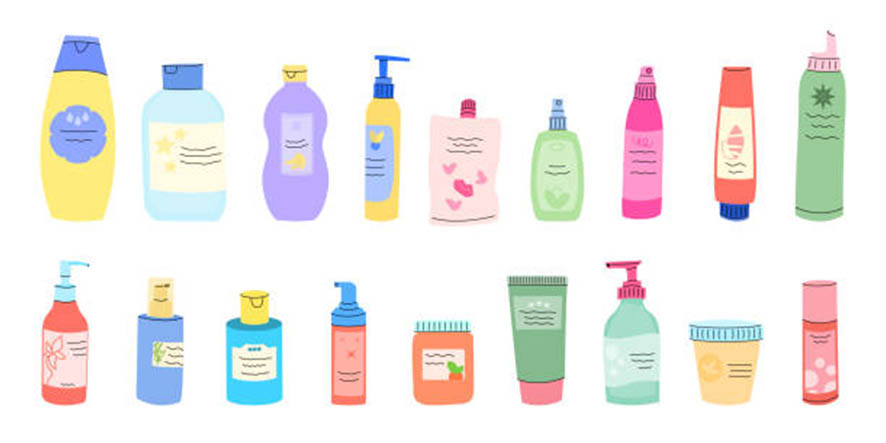
We hope you now have a better understanding on shampoos and why your shampoo could be causing hair loss. Shampoos are a must-have as they are effective in cleaning your hair. Make sure to avoid shampoos that cause hair loss and find shampoos that will have your hair thriving.










